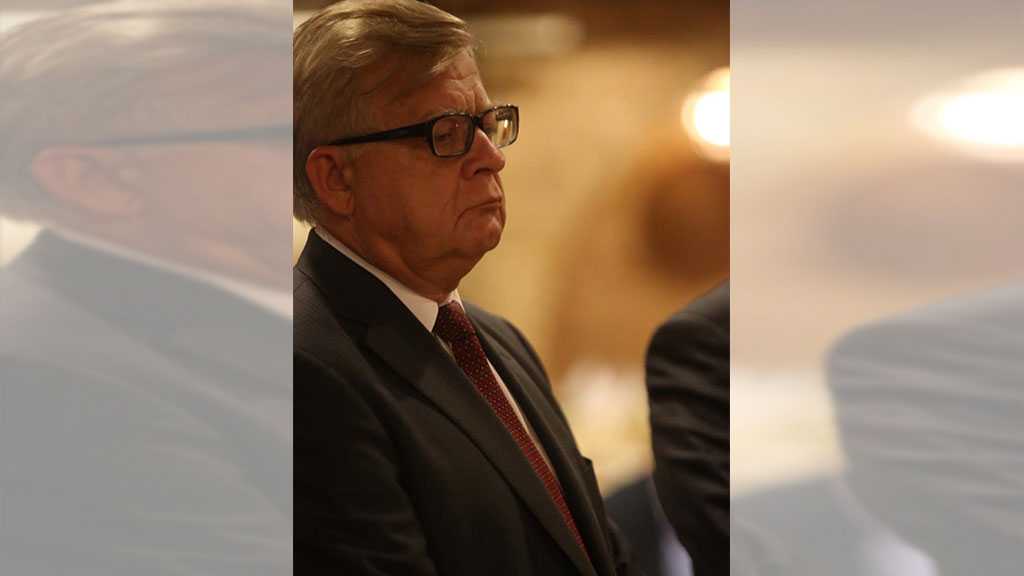
Russian Envoy to Beirut: US Preparing for Chaos in Lebanon

By Firas Al-Shoufi, Al-Akhbar Newspaper
These days the Russian Ambassador to Lebanon Alexander Zasypkin is not exactly optimistic. His experience in Lebanon and his careful observation of regional affairs have led him to reach a political conclusion. He believes that resolutions to most regional issues are not on the horizon.
Zasypkin cites President Vladimir Putin’s recent reply to a question about current and future challenges. “Things are getting more difficult,” the Russian leader said.
The diplomat quickly reviews the world's crises and the American role in creating them. From Venezuela, to the African continent, to Asia, Europe, Eastern Europe, Ukraine, and the Middle East, he concludes that the Americans are vehemently opposed to the Russian vision, which is based on respect for state sovereignty and international law.
From these crises, Zasypkin focuses his microscope on the situation in Lebanon. While he is well aware of the magnitude of the country's stifling economic crisis, which has been accumulating for many years, he attributes the foreign currency crisis and the political-economic conditions to an American plan aimed at sowing chaos in Lebanon.
That US-fuelled chaos is aimed at striking Hezbollah in Lebanon and Washington’s foes in the region. He backs his argument by pointing to the fact that the Working Group for Lebanon, composed of ambassadors from the five major powers, has always included in its first item the principle of maintaining internal stability and the security situation. But he feels that the US is ignoring this principle. And Washington’s plan to bring about an economic collapse and upheaval is threatening the stability of Lebanon. This is part of the American war to subjugate its opponents, rather than preserving and protecting this country.
Replying to whether US interest would be affected if Lebanon collapses, Zasypkin answers with a question of his own.
“In the event of an economic and state collapse, what is the only entity that would maintain its cohesion?” Zasypkin asks before replying. “It is Hezbollah.”
As such, the veteran diplomat does not expect the Americans to venture so far, but rather to try to keep the country under pressure, in crisis and on the brink.
From Lebanon, the ambassador moves onto discussing the conflict in the Persian Gulf. He rules the possibility of an all-out war due to its high cost for all those involved. But he does not believe that the position of the Arab monarchies in seeing Iran as an "absolute evil" and trading allegations help open the door to dialogue or identifying mechanisms of joint action. He also stresses that events now require an Iranian-Saudi dialogue without preconditions, pointing out that the current struggle benefits the US by granting it control over the wealth of Arab monarchies.
In Ukraine, the ambassador explains how the crisis, following an agreement between the two presidents Putin and Volodymyr Zelensky, escalated this week with clashes returning to Donbass because of pressure from the NATO-backed Nazi forces on the new Ukrainian president. Ukraine is no exception in the US incitement against Russia in Eastern Europe and in the former republics of the Soviet Union. Meanwhile, hostilities are being fuelled in Poland and in neighboring countries coinciding with the deployment of missiles and the strengthening of NATO military bases.
However, Zasypkin’s lack of optimism does not translate into pessimism. According to the diplomat, Russia’s achievements as a state in recent years in terms of military advancements, the forging of foreign relations, and Moscow’s return as a powerful player on the international arena should not be underestimated.
As far as the Middle East is concerned, the ambassador says Russia's relationship with Syria and Iran serve as a model of how Moscow maintains its alliances as opposed to the Americans, who abandon their allies for their own interests.
He asserts that in addition to the friendship and alliance with Syria and Iran, Russia was able to build good relations with Turkey as well as the Gulf states. Moreover, he notes that the US sanctions and economic war have failed to destroy the Russian economy, which remains stable.
Comments



